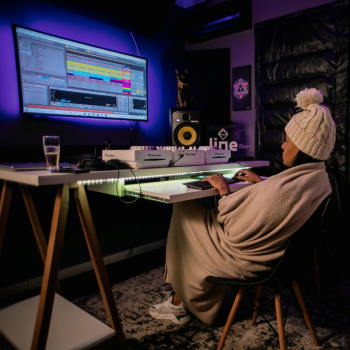How To Improve Your Music Production Skills

Whether you are a recording artist or someone who wants to become one, there are always ways to take your music production skills to the next level.
In this blog post, we look at 5 tips that help you with that.
1. The right music recording space
The studio and its sound quality are crucial to professional music recording.
The acoustics of the space around you can directly influence how your microphone picks up on your playing and singing.
You have a few options here:
You can rent a studio when you need it or when your music is written and you want to record it.
Or you can create a decent music studio in your own home or space.
A home recording studio is cheaper long-term, you just need to invest in necessary equipment upfront.
2. The necessary music recording equipment
For a home recording studio, you need:
- Studio monitors for accurate sound reproduction
- Record player
- A condenser microphone for capturing vocals and acoustic instrument
- An audio interface to connect the microphone and studio monitors
- Studio headphones for monitoring the audio signal while recording
Read more about Essential Music Equipment For Your Home Recording Studio.
It can get a little expensive to complete a full recording studio, so consider second-hand, or buy bit by bit, over time, and record early versions with what you’ve currently got. You can always revisit them when you’ve got better equipment.
3. An ear for interference
Recording sound is an interesting thing. What might sound clear to you while you’re playing, can sound different when you listen to it through your production setup.
Improving the acoustics of the physical space and soundproofing it should be a priority.
You could also look at cable management products that enable equipment have clean, untangled connections, as these can interfere with the sound quality.
4. Have a set process for recording
Have a clear and orderly method for recording music. Recording the layers of the song separately is mandatory for those who don’t have a whole band to play alongside, but the order in which you record different layers can help make the process a lot smoother.
You might even record or use sound assets that don’t go into the final song, such as a pre-recorded drum loop or a scratch track that you can follow.
From there, most musicians tend to record the rhythm section, then the harmonies, then the melodies, then they add what fills, samples, and vocals finish off the track. Don’t think of it as recording from beginning to end in sequence, but rather in finishing one layer at a time for the best results.
5. Get used to your mic
The microphone is, of course, one of the most important pieces of equipment for recording music, so use the right mic for both the environment that you’re recording in as well as the instrument you’re using.
Learn how to record well with the mic that you’re using. What kind of distance is optimum for a clean sound? Do you need to angle it to better catch the sound (as is the case with acoustic instruments?), do you need any accessories such as a pop filter for capturing vocals well? Get to know your mic, and practice with it, so you know how to use it effectively.
Finally
If you’re serious about producing top-quality music, then talk with producers and bands online. Always be improving your craft.
Musical talent is essential, but you need hard work, and passion to make it.
